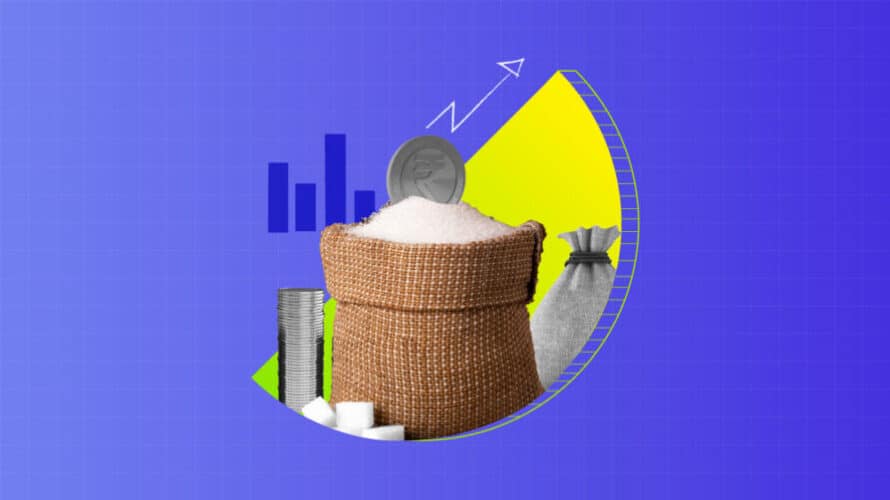Best Sugar Stocks in India 2025: Top Picks and Industry Outlook

Introduction: Why Sugar Stocks Matter in India
Sugar stocks in India—companies engaged in sugarcane cultivation, refining, ethanol production, and distribution—are currently in focus. India is the second-largest producer and consumer of sugar after Brazil, making this sector strategically important.
The fortunes of sugar companies depend on:
- Global demand & commodity prices
- Government policies (price ceilings, subsidies, ethanol-blending programs)
- Climate change & monsoon impact on sugarcane yield
- Export-import restrictions
Although the best sugar stocks in India can reward investors handsomely, the sector remains highly cyclical and policy-driven.
Sugar Industry in India: An Overview
India’s sugar sector is one of the largest in the world, employing:
- 50 million farmers growing sugarcane
- Half a million workers employed in sugar mills
Key Production Hubs
- Maharashtra – Top sugar-producing state
- Uttar Pradesh – Large-scale private & cooperative ownership
- Karnataka & Haryana – Major contributors
- Tamil Nadu – Emerging ethanol producers
According to ISMA (Indian Sugar Mills Association), India’s sugar production for 2023–24 is expected to exceed 34 million tons, an upward revision from earlier estimates.
Fun Fact: Unlike wheat and rice buffer stocks managed by FCI, sugar buffer stock is maintained jointly by sugar mills to stabilize wholesale prices.
Top Sugar Stocks in India 2025 by Market Capitalization
Here’s a snapshot of the leading listed sugar companies:
| Company | Market Cap (₹ Cr.) | Close Price (₹)* | PE Ratio | 1Y Return | ROCE (%) |
|---|---|---|---|---|---|
| EID Parry (India) Ltd | 11,062.01 | 779.50 | 11.68 | 23.15% | 27.77% |
| Shree Renuka Sugars Ltd | 9,503.71 | 50.80 | -48.25 | -5.70% | 17.12% |
| Balrampur Chini Mills Ltd | 7,984.23 | 460.50 | 28.10 | -5.02% | 13.19% |
| Triveni Engineering Ltd | 7,955.85 | 408.50 | 4.44 | 30.67% | 65.93% |
| Piccadily Agro Industries Ltd | 6,609.41 | 787.65 | 60.22 | 1,379.62% | 52.88% |
| Bajaj Hindusthan Sugar Ltd | 4,579.33 | 43.17 | -33.99 | 149.31% | 0.74% |
| Bannari Amman Sugars Ltd | 3,381.14 | 3,170.00 | 23.58 | -5.83% | 15.10% |
| Dalmia Bharat Sugar Ltd | 3,331.06 | 402.35 | 13.32 | 12.51% | 11.94% |
| Dhampur Sugar Mills Ltd | 1,518.95 | 220.25 | 11.31 | -4.48% | 17.42% |
| Uttam Sugar Mills Ltd | 1,365.15 | 328.75 | 11.04 | 31.12% | 29.90% |
Closing price as of July 26, 2024
Company-Wise Analysis of Leading Sugar Stocks
EID Parry (India) Ltd
- Part of the Murugappa Group
- Strong ethanol business + stake in Coromandel International (agri-inputs)
- Consistent diversified revenue streams
Shree Renuka Sugars Ltd
- India’s largest sugar refiner
- Strong focus on ethanol-blending policy with petrol
- Power co-generation adds to revenue streams
Triveni Engineering & Industries Ltd
- Leading sugar & ethanol producer
- Recently increased stake in Sir Shadi Lal Enterprises (61.77%)
- Transitioning into an integrated sugar-alcohol-energy company
Piccadily Agro Industries Ltd
- Operates in sugar & distillery segment
- Acquired 89% stake in Nirvana Biosys (wine maker) in Feb 2024
- Strong ethanol and beverage diversification play
Balrampur Chini Mills Ltd
- One of India’s largest sugar manufacturers
- Owns distillery + electricity generation units
- Expansion via acquisitions and modern tech adoption
Factors to Consider Before Investing in Sugar Stocks
- Market Conditions – Weather, monsoon, and global demand impact output.
- Financial Performance – Look at revenue, margins, debt levels, and ROE.
- Government Policies – Price controls, subsidies, ethanol mandates.
- Competition – Industry is highly fragmented with large & regional players.
- Technological Advancements – Modern farming, processing & ethanol production can boost efficiency.
Should You Invest in Sugar Stocks?
The sugar sector can be highly profitable but cyclical.
Reasons to Invest:
- India’s strong sugar & ethanol demand
- Government’s ethanol-blending program (boosts profitability)
- Rising exports & global demand
Risks to Watch:
- Policy interventions (export bans, price controls)
- Climate dependency (rainfall & sugarcane yield)
- High volatility in sugar prices
A balanced strategy would be to diversify within the sector, choosing companies with ethanol exposure, strong balance sheets, and integrated operations.
Bottom Line: Outlook for Sugar Stocks in India
The outlook for sugar stocks in 2024 remains positive, supported by:
- Ethanol-blending policy driving demand
- Export incentives & subsidies stabilizing cash flows
- Technological improvements in farming and processing
However, due to policy uncertainty and cyclical risks, sugar stocks are best suited for investors with medium to high risk tolerance.
FAQs on Sugar Stocks in India
Q. Which is the No. 1 sugar stock in India by market cap?
A. EID Parry (India) Ltd is the largest by market cap.
Q. Are sugar stocks cyclical?
A. Yes. They are highly cyclical, influenced by weather, policy, and global demand.
Q. How does ethanol blending impact sugar companies?
A. It provides an additional revenue stream, improving profitability and reducing dependence on sugar price cycles.
Q. Are sugar stocks good for long-term investment?
A. Only if chosen wisely—prefer integrated players with ethanol, distillery, and power segments for stability.
Q. Which states lead sugar production in India?
Maharashtra, Uttar Pradesh, Karnataka, and Haryana.
Sugar stocks in India can be a sweet addition to your portfolio—but only if you understand their cyclical nature, monitor government policy, and pick fundamentally strong players.




